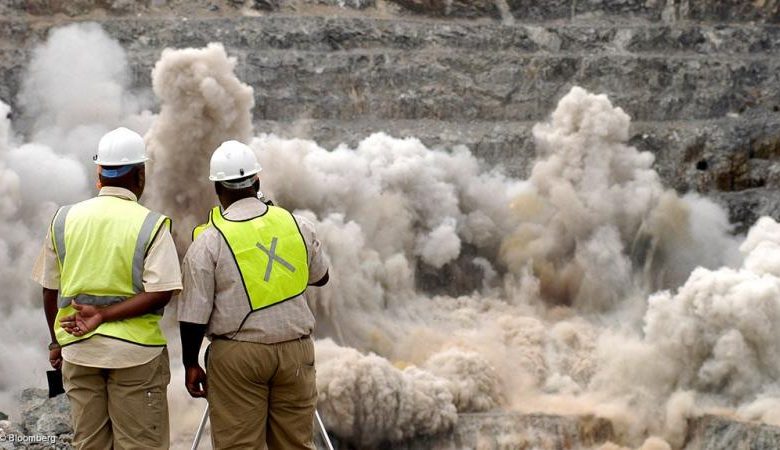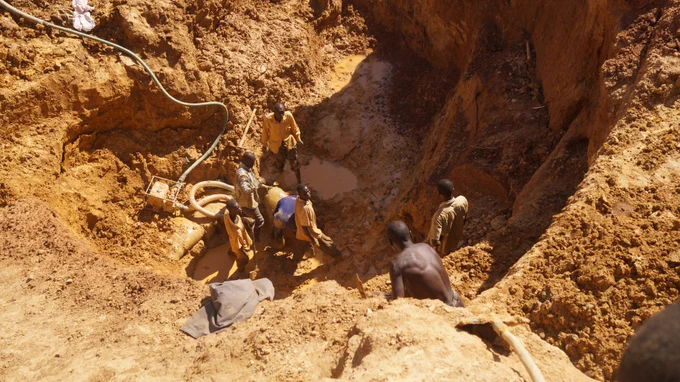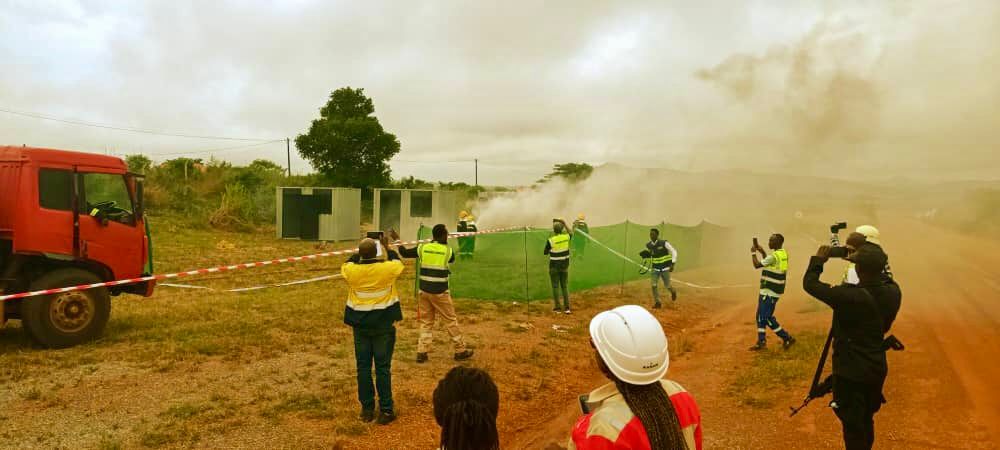Ten billion shillings explosives penalty doesn’t address mining sector challenges, bound to fail – stakeholders speak out
The Executive Director of Global Rights Alert (GRA), Winfred Ngabiirwe, explained that regulations should be done looking at the greater good such as the impacts when the miners use the explosives wrongly.

A new law that will affect the mineral sector proposes outrageous penalties like a monetary fine of Shs10 billion and a jail term of ten years. The proposed law, which is being called the Explosives Bill, 2023, specifically targets the use of explosives in the mining sector.
On Tuesday, August, 15th 2023, the State Minister for Internal Affairs, Gen. David Muhoozi, while tabling the Bill before Parliament told Members of Parliament (MPs) that the Explosives Bill, 2023 is intended to streamline the licensing of explosives and their use in the mining sector.
The Minister of State for Internal Affairs, David Muhoozi has tabled the Explosives Bill 2023, seeking to repeal the 87year old seeking to repeal The Explosives Act Cap. 298 to provide for restrictions on the manufacture, storage, use, dealing, import, export and transportation… pic.twitter.com/YKqZwJSXwB
— Parliament Watch (@pwatchug) August 15, 2023
He also said that the upcoming law repeals the existing Explosives Act 1936 and creates the position of Chief Explosives Inspector, among others; however, stakeholders are now questioning the motive of the government for introducing a law that is not practical.
Hard to regulate explosives use
Muhoozi explained to MPs that the absence of major reforms in the existing laws on explosives has made it difficult to regulate the use, storage and manufacture of explosives. This, he said, has resulted in unauthorized access to explosives.

The minister said: “The Bill, therefore, seeks to regulate the manufacture, storage, use, dealing, import, export and transportation of explosives for purposes of averting any security threats relating to explosives.”
But while some stakeholders Charmar News spoke to for this article say the law is good as far as preventing the use of explosives and chemicals in the mining sector is concerned, they feel the penalties suggested are out of the roof.
Stakeholders, however, admit that explosives have dire consequences on the lives of people who use them.
Tom Nsubuga, the Chairperson of Miners Forum Uganda, says the penalty should be fair and considerate. He said Parliament should have first done a lot of sensitization to make miners, especially artisanal miners, understand the risks and negative impacts of using chemicals and explosives.
“For starters, Parliament should have at least done a lot of sensitization and then come up with the fines and jail time punishments,” Nsubuga told Charmar News in a recent interview.
He added:
We have moved around but people are not aware of the consequences of using explosives. They handle them with their bare hands and also dispose them off to the environment.
No ordinary person uses explosives
For one to use explosives during mining, they are required to have the explosives certificate from the Directorate of Geological Survey and Mines in Entebbe. However, the process of acquiring this certificate is quite long and a deterrent, according to Nsubuga.
The wrong people end up going the extra mile to acquire this certificate which they misuse.
Now Nsubuga suggests that the Directorate revises the process to ensure that the right people are given these certificates. He also suggests that the people who acquire the certificates and misuse them should be the first to be penalized.
“…because these explosives are not used by ordinary miners. These people get the licenses from government. Police should follow up on how they use them,”

The Executive Director of Global Rights Alert (GRA), Winfred Ngabiirwe, explained that without focusing on the supplier and the regulator, government will have missed a point since the problem usually arises from these two parties.
Look at the greater good than punishing
The Global Rights Alert boss explained that regulations should be done looking at the greater good such as the impacts when the miners use the explosives wrongly.
What is the impact if miners misuse these explosives while doing their work vis-à-vis fining them Shs10 billion in an economy that is struggling?
Ngabiirwe questioned.
She elaborated that sometimes government systems don’t work in time thus leading to the illegal use of explosives.
Ngabiirwe warned that once the regulations are not proper, the officers in charge will not do a job. This, along with laxity, people will try to abuse this law. However if regulators can monitor them, people will follow the legal way, she said.
Not practically possible
Bwesigye Don Binyina, the Executive Director of the Africa Centre for Energy and Mineral Policy (ACEMP) told Charmar News in an interview that the use of explosives in the mining industry is as old as mining itself. He, however, said that what the Parliament is proposing is not practically possible.

He said the penalty is extremely harsh because most of the people who misuse these explosives are small-scale mines; few of them can even earn Shs100 million as their net income a year.
“So if you are putting a penalty of billions, how realistic and applicable is it? We appreciate the need for regulations but we think some of these statements need to be thought through,” Bwesigye said, explaining that the high price is a deterrent. How practical is it to be enforced, he questions, noting that very few people can afford to pay that money.
Bwesigye highlighted that the law should not act in a vacuum, a principle that should be considered when making the law. It should take into consideration the circumstances under which these miners are operating and what alternatives the is government providing to the miners to shift away from the use of explosives.
When asked whether the bureaucracy in acquiring these explosive licenses doesn’t contribute to their abuse, Bwesigye said that even if the procedure is there it’s not known to artisanal miners or small-scale miners.
Energy ministry must play a role
The Africa Centre for Energy and Mineral Policy suggests that a clear policy should be put in place and executed in collaboration with Mineral Energy and Mineral Development.
Bwesigye admitted that as civil society, they have not done enough to sensitize the miners on the usage and storage of these explosives despite it being the mandate of the Ministry of Energy and Mineral Development.
More of what the Bill suggests
The unlicensed importation or exportation of explosives is to be prohibited if clause 31 is passed. This carries a harsh penalty of 10 years in jail and or Shs10 billion in fines.

Transportation of explosives without a valid license is also lined up for prohibition under clause 34 of the Bill with offenders facing a Shs10 billion fine and or 10 years in jail.
Under Clause 40, the Bill seeks to create vicarious liability on the part of directors or executive heads of legal entities found in violation of any provisions, should the Bill become law.
The Clause says:
Where an offence provided for under this Act is committed by a legal entity, a director or the executive head of the legal entity is deemed to have committed that offence.
Relatedly, Clause 41 creates a duty of care on the part of persons or entities using explosives and sets out punishment for careless offenders to negligently injure neighbours or damage their properties, a provision which could turn out to be a major relief for families that are constantly in courts wrangling with companies whose blasting activities cause massive damages to their properties.
Clause 44 creates an obligation on those using explosives to mind the environment and put in place measures to safeguard properties from harm and damage arising from explosives.
According to Parliament’s Rules of Procedure, the Committee has up to 45 days to scrutinize and process the Bill for second reading.







